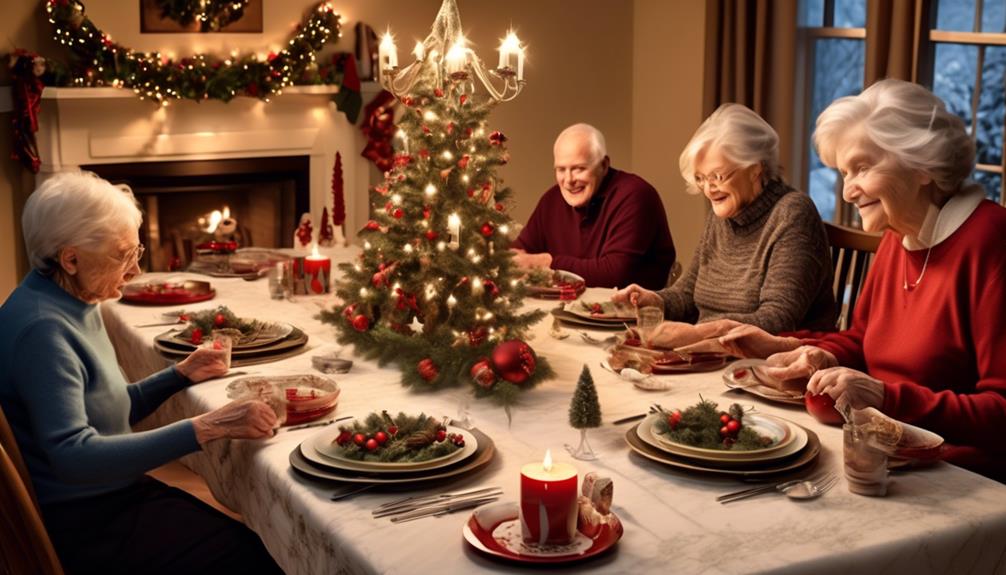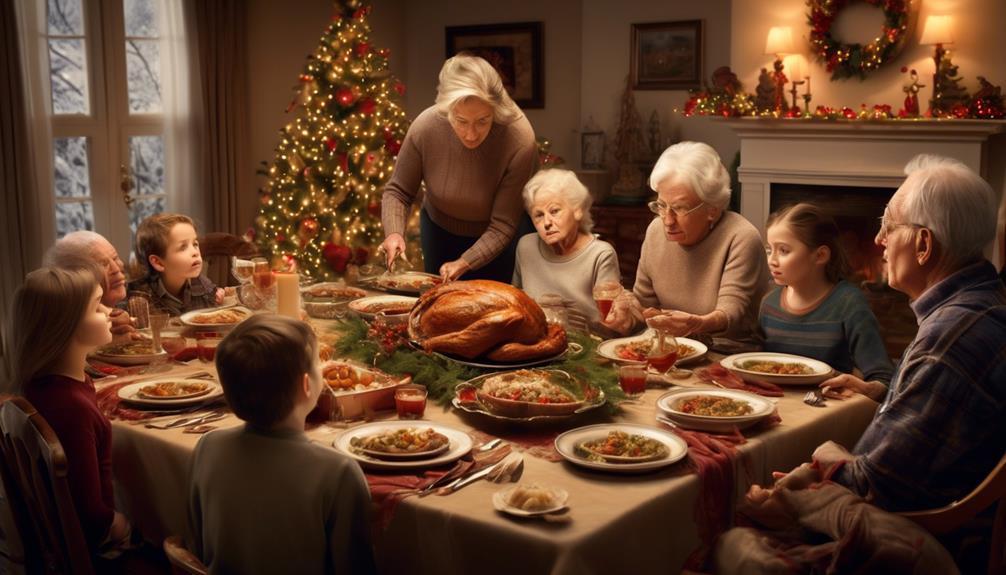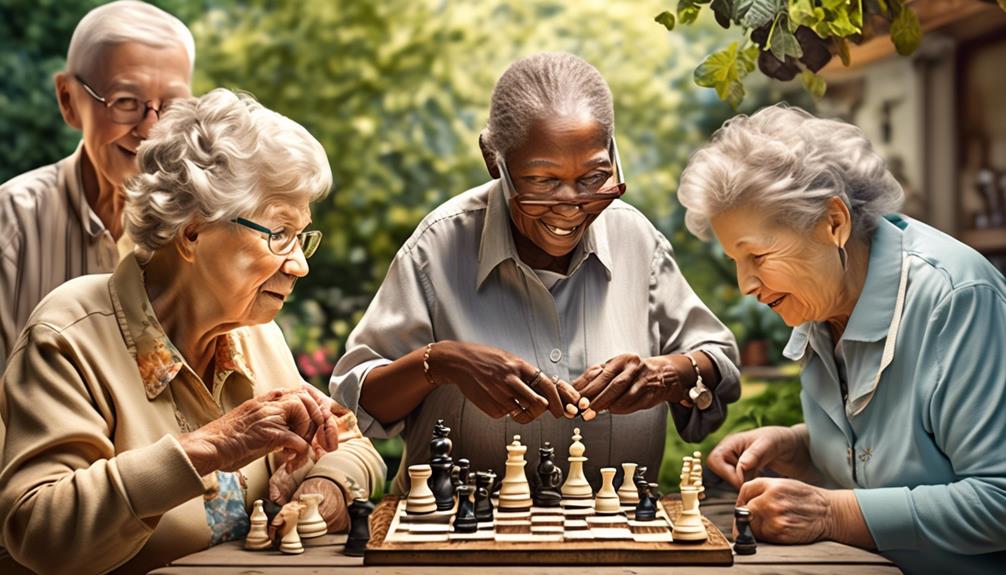During the holiday season, when a loved one is dealing with dementia, they encounter a crucial yet often overlooked aspect. Handling dementia during the holidays presents distinct obstacles that necessitate thoughtful preparation and reflection.
Understanding how to tailor holiday traditions and activities to ensure safety and comfort for individuals with dementia is essential. By exploring effective strategies and practical tips, families can create meaningful and inclusive celebrations that prioritize their loved one's well-being.
Join us in discovering insightful approaches to navigate the holidays with dementia, fostering a sense of connection and joy for all involved.
Key Takeaways
- Maintain familiar routines for comfort and stability.
- Adapt communication for understanding and connection.
- Modify traditions for safety and calmness.
- Engage in dementia-friendly celebrations for meaningful experiences.
Understanding the Challenges
Navigating the holidays with a loved one who's dementia can present unique challenges due to the changes in routine, loud environments, and potential triggers that may cause stress and disorientation. During this festive season, it's crucial for families to provide extra support and understanding to their loved ones with dementia. The holiday period can bring about a mix of emotions and memories, which may be confusing for individuals experiencing cognitive decline.
To alleviate stress, maintaining familiar activities and routines can offer a sense of comfort and stability. Loud noises and crowded spaces should be minimized to prevent overwhelming your loved one. Being mindful of potential triggers, such as certain scents or sounds, can help create a more peaceful environment. Additionally, ensuring that your family member feels surrounded by familiar faces and engaging in activities that evoke positive memories can greatly enhance their holiday experience.
Creating New Memories

Understanding the challenges of navigating the holidays with a loved one who has dementia can lead us to the importance of creating new memories during this festive season. Engaging in familiar activities can slow disease progression and provide emotional benefits for individuals with dementia. Making new memories while maintaining holiday traditions is therapeutic and can lead to meaningful moments. Utilizing non-verbal cues and clear communication aids in connecting with our loved ones. Adapting to changes in behavior, recognizing warning signs, and seeking support from groups can help create a holiday filled with quality time. When spending time with a person with dementia, it's essential to focus on the present moment and cherish the memories being made. Below is a table to inspire you to create new memories and adapt traditions for a memorable holiday season:
| Activities | Meaningful Moments | Non-Verbal Cues |
|---|---|---|
| Baking holiday treats | Sharing joy and laughter | Smiling and nodding |
| Listening to music | Evoking nostalgia | Holding hands |
| Watching old movies | Recalling fond memories | Gentle touch |
| Crafting decorations | Creating together | Eye contact |
Effective Communication Strategies
When communicating with individuals who have dementia, it's crucial to simplify language and incorporate non-verbal cues to enhance understanding and connection.
During holiday preparations and family gatherings, it's essential to consider the cognitive abilities of the individual with dementia. Creating meaningful interactions involves reducing stress by setting realistic expectations and providing a quiet space for communication.
Extra time should be allowed for responses without rushing interactions, ensuring that information is clear and concise. Validating feelings and emotions is key, matching tone with the message being conveyed.
Effective communication strategies include incorporating humor, using redirecting techniques, and adapting communication methods to maintain connections.
Modifying Traditions for Safety

To ensure a safe and comfortable holiday experience for individuals with dementia, it's important to modify traditions with their well-being in mind. As a family caregiver, adapting holiday celebrations can help reduce stress and create a familiar environment for your loved one. Here are some practical ways to modify traditions for safety:
- Modify decorations: Choose non-breakable decorations to prevent accidents and opt for battery-operated candles instead of real ones to reduce fire hazards.
- Simplify activities: Select fewer and less complex decorations to minimize confusion and provide a sense of calm.
- Create a familiar environment: Use decorations that are familiar to your loved one to evoke positive memories and feelings of comfort.
- Use soft lights: Opt for soft, soothing lights instead of bright flashing ones to prevent sensory overload and promote relaxation.
- Prioritize safety: Avoid decorations with small parts that could pose a choking hazard for individuals with dementia.
Celebrating in Nursing Homes
Celebrating holidays in nursing homes provides residents with dementia the opportunity to engage in familiar traditions and activities that promote a sense of community and joy. Staff can organize dementia-friendly celebrations that include holiday-themed decorations and music, evoking positive memories. These celebrations create a warm and inviting atmosphere, allowing residents to reminisce and partake in meaningful experiences. Family members visiting during these times can join in the festivities, enhancing social engagement and fostering connections with their loved ones.
| Activities | Benefits |
|---|---|
| Holiday-themed decorations | Evoke positive memories |
| Music | Promotes joy and community |
| Social engagement | Encourages connections |
| Meaningful connections | Foster a sense of belonging |
Frequently Asked Questions
What Are 3 Things to Never Do With Your Loved One With Dementia?
When caring for a loved one with dementia, it's crucial to remember three things to never do:
- Don't argue or correct their reality, as it can cause frustration.
- Avoid rushing or pressuring them, which may lead to anxiety.
- Never leave them alone in unfamiliar or dangerous situations to ensure their safety.
These actions can help maintain their well-being and create a supportive environment for them during challenging times.
What Is the Average Age of Death for Someone With Dementia?
We can understand the concern about the average age of death for someone with dementia. It's crucial to note that this can vary based on the type of dementia and individual health factors.
Alzheimer's disease, the most common form, typically leads to 4 to 8 years of life post-diagnosis. Vascular dementia, another prevalent type, may result in a shorter lifespan.
Early detection and proper care can enhance quality of life and potentially extend one's time.
What Are Signs That Dementia Is Getting Worse?
As dementia progresses, signs that it's worsening may include increased forgetfulness, difficulty with daily tasks, changes in mood and behavior, decline in communication skills, and worsening physical abilities. These indicators can be distressing for both the individual and their loved ones.
Seeking support, adapting routines, and ensuring safety are crucial steps to navigate this challenging journey effectively. It's essential to approach these changes with patience, understanding, and compassion.
At What Stage Do Dementia Patients Forget Family Members?
As dementia progresses, patients may forget family members at different stages. In the early stages, they might struggle with short-term memory, affecting recent interactions.
In the middle stage, recognizing familiar faces, including family, can become challenging.
By the late stage, significant memory loss may prevent them from remembering even close family.
Adapting our interactions and communication with compassion and patience is crucial as memory loss impacts their ability to recognize loved ones.
Conclusion
As we journey through the holiday season with our loved ones living with dementia, let's remember to be the gentle breeze that guides them through the storm.
Like a beacon of light in the darkness, our support and understanding can illuminate their path, creating a warm and welcoming environment filled with love and cherished memories.
Together, we can navigate the challenges and embrace the joy of the holidays, creating new traditions that honor the beauty of connection and care.









